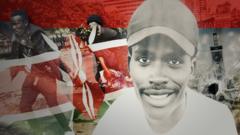In a shocking revelation, the BBC has traced the identities of the security personnel who shot and killed anti-tax protesters during demonstrations outside Kenya's parliament last June. Detailed analysis of over 5,000 images and videos from the protest found that the deceased were unarmed and did not present a threat, highlighting a glaring violation of the constitutional right to peaceful protest in Kenya.
Following a parliamentary committee's directive, the Independent Policing Oversight Authority (IPOA) was tasked with investigating the incident. However, reports are yet to be published, and no one has faced consequences for the killings. On June 25, 2024, a massive wave of protests erupted as young citizens, dubbed “Gen Z protesters,” assembled in Nairobi against the government's controversial finance bill.
Prominent human rights activist Boniface Mwangi described the gathering as a joyful “carnival” atmosphere, encapsulating youthful energy and determination. Social media platforms buzzed as demonstrators, equipped with speakers and slogans, rallied against proposed tax increases on essential goods, successfully pushing back against past regressive policies.
However, chaos ensued as the protest escalated. The police attempted to control the crowd using tear gas, water cannons, and rubber bullets, while inside the parliamentary chambers, lawmakers proceeded with voting on the contentious finance bill. As protests intensified, a plain-clothed officer, later identified by the BBC as John Kaboi, incited violence by shouting a command to "kill" before shots rang out, resulting in the deaths of David Chege and Ericsson Mutisya, both unarmed.
Further turmoil unfolded as demonstrators breached police barriers, gaining access to parliamentary grounds. Shots fired again claimed the life of 27-year-old Eric Shieni, underscoring a pattern of lethal force employed against peaceful protesters. Eyewitness accounts detailed the brutality, with many fearing for their lives amid government critiques labeling demonstrators as “organized criminals.”
Despite the fallout that evening, President William Ruto, while acknowledging the nationwide sorrow, lauded security forces for their “defense of the nation.” The next day, in response to growing dissent, he announced the finance bill would be scrapped, yet a cloud of impunity for security personnel looms as no investigations have been comprehensively pursued.
The brutal violence during the protests has left a dark mark on Kenya, with ongoing demands for accountability echoing throughout the nation. As the story unfolds, the world watches, awaiting justice for the victims of state-led violence.



















